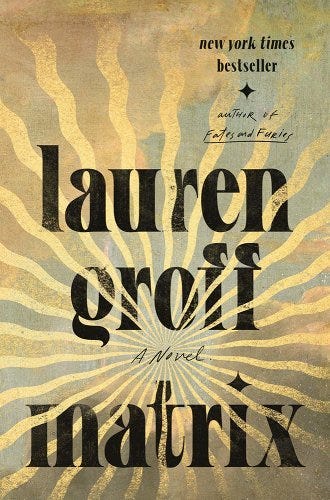As a college student, I took a course called “Medieval Women Writers” in which we read fully all of the medieval women writers, because if memory serves and it often does not nowadays, there were a confirmed sum total of about twelve.
Two other tidbits I dimly recall:
Literally the only man in the class was the professor, which is disappointing, let us hope today’s male students are More Enlightened.
There may have been many more medieval women who wrote anonymously or under noms de plume, but because women were discouraged from reading, writing and opining, they’re lost to verifiable history.
We’re taking this dusty little walk down memory lane as a prelude for Matrix, the latest novel by Lauren Groff, which is not in fact about math(s) or science fiction as I rather humiliatingly assumed, and which I enjoyed!
If you read Groff’s last novel Fates and Furies (which you should) you know she has an unsparing ferocity of voice about the ways women are sidelined, marginalized and underestimated. That’s at play here in this historical novel about 17-year-old Marie de France, a relative of Eleanor of Aquitaine who’s exiled to a failing abbey. When Marie cannot talk, bargain or write her way back to court, she turns her considerable vision and talents to transforming the abbey and imagining a different world for her and her sisters. (Despite the Wachowski association, in this case, “Matrix” derives from the Latin word for ‘mother’. If I had studied Latin I might have picked up on this before the book spelled it out for me.)
11th-century French poet Marie de France did exist, but because there’s not much known about her, Groff is free to unleash her imagination on this novel. I don’t know if it’s well-researched but it certainly feels well realized, turning a medieval abbey setting into a fully physical, living, visceral setting with women at the power center in both Marie and Eleanor. Feminist, yes, but much more, it’s deeply female in an interesting way.
The novel is a somewhat episodic time skip throughout Marie’s life as a nun, and as such doesn’t exactly build to one narrative tension climax. If I had a critique, it might be this, that it’s a series of meditative questions and cycles rather than one crescendo.
But in reflection, I think that worked for the book, to have a series of peaks throughout, almost like Marie’s series of visions or the rhythm of canonical hours, about so many of the profound questions and themes of art: the sacred in relationship with the profane; women’s art; passion; the influence and limits of beauty; faith (or lack thereof, or maybe faith vs religion); and the corrupting forces of power. It’s lusty, ambitious, provocative and personal, all at the same time.
And even though these are the Big Life Topics, happily this is not a trudging read. Matrix is deeply readable - very much in the Wolf Hall vein of historical fiction but in some ways even more accessible. It’s exciting and tense in points, violent and bold in others, intimate and internal in still others. Groff’s writing is appropriately magisterial and formal while still appealing to a modern ear.
Anyway - I liked it and maybe you will too! And if you don’t believe me, it was also one of Barack Obama’s top 2021 books. (Question, do we think Obama never reads anything frivolous? Or does he just not confess to it? I would like him to say “you know what, that Jessica Simpson memoir was juicy.” Normalize joyful reading, 44!)
Have you read this? Let me know whether you agree with me and Barack, or if we’re off-base:
This week’s book confession:
The internet was ablaze with book banning this week, which is unequivocally bad. The only good thing to come out of it was Gen X recalling the truly and wildly inappropriate reading habits we all had:
Never has any tweet so perfectly explained me, a youth who ricocheted wildly from Anne of Green Gables to Jaws (a much sexier book than the movie might indicate) to The Babysitters Club to Judith Krantz to Archie comics to VC Andrews, Stephen King and Mary Higgins Clark. No book within 500 yards was safe from my predations.
Contemporaries, please share the books you had exactly zero business reading at a young age. (And then protect your local libraries, schools, and young readers.)
Claudendo dicta:
If you didn’t know, Google says that “Claudendo dicta” means ‘closing remarks’ in Latin, because I love nothing more than creative consistency.
Don't forget to check the archive for past genres ranging from non-fiction to YA to mystery to fantasy. Pretty much something for everyone unless you exclusively read business books to which I say, live a little.
All links go to bookshop.org, which supports independent bookstores. You can view my entire catalog of recommendations here (any money made via these referral links will be donated to Defy Ventures.) Also right now they have a promotion where you can win free books for life! Go check that out.
What’s a lamb rating, you ask? Don’t worry, I gotchu here.
If you’re still reading this far, did you know that many people believe the first recorded writer was a Sumerian woman and priestess in 23rd century BC, Enheduanna? I literally had never heard this until now!








